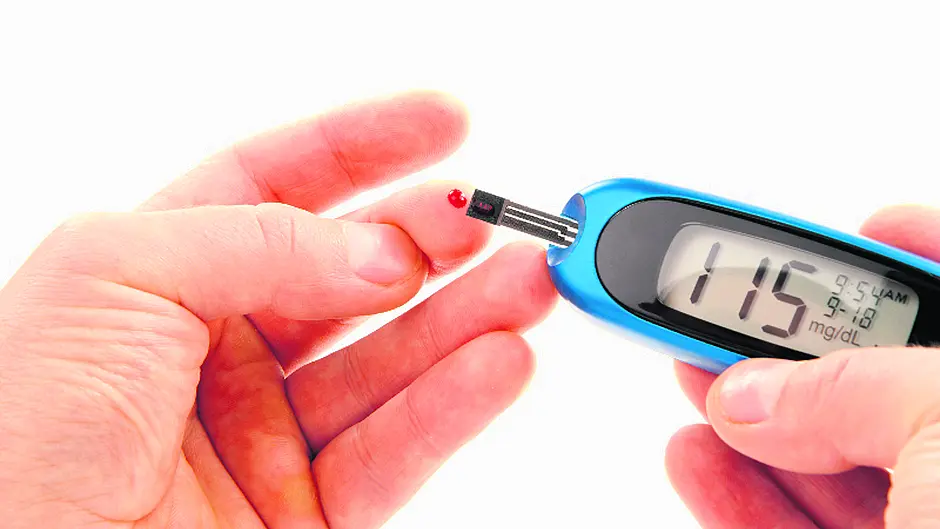With World Diabetes Day falling on November 14th, we’ve been served a timely reminder that hand in hand with obesity rates, the number of diabetes diagnoses is rising at an alarming rate. I don’t want to concentrate on the negative here, but it has to be said that there are now an estimated 225,840 people here living with the condition, around ninety percent of whom have lifestyle-driven type 2, and the figure is expected to climb to almost 279,000 within fifteen years.
WITH World Diabetes Day falling on November 14th, we’ve been served a timely reminder that hand in hand with obesity rates, the number of diabetes diagnoses is rising at an alarming rate. I don’t want to concentrate on the negative here, but it has to be said that there are now an estimated 225,840 people here living with the condition, around ninety percent of whom have lifestyle-driven type 2, and the figure is expected to climb to almost 279,000 within fifteen years.
Up to 24,000 Irish people may be unaware that they have diabetes – look out especially for tiredness, weight loss, and an increased need for fluids and urination. In April a large VHI study found that 17% of people randomly tested had abnormal blood sugar levels (a sign of pre-diabetes), men two to three times more often than women, and that the risk of type 2 increases by a shocking 89% with every 5kg increase in weight. It can’t be overstated that type 2 diabetes is an almost entirely preventable condition, and one that can even be reversed under a medically supervised diet and exercise regime, but also one that is often poorly managed. Following your doctor’s advice is so important because the ramifications can be severe: diabetes, for example, is the leading cause of blindness in Ireland (make sure if you’re a sufferer that you are registered for your free eye checks).
Unmanaged, it can also contribute to kidney failure, blood clots, amputation and heart disease. Women with diabetes are 40% more likely to have a heart attack than men with diabetes; all diabetics have a 50% higher risk of hospitalisation, and double the risk of non-diabetics of twenty-four cancers. The highest rates are for pancreatic and liver cancer, and it seems likely that raised blood sugar levels promote the growth of tumours.
Whether you’ve been diagnosed with diabetes, or want to reduce your risk, the central consideration is to cut out all refined sugars and grains such as white bread, rice and pasta, all of which act like sugar in the body, rapidly raising blood glucose levels and stimulating the laying down of fat. The old prototype diet for diabetics, with its insistence on high carb and low fat, has thankfully now been dismantled. Small amounts of whole grains like brown rice, oats, buckwheat and quinoa will reduce your risk, but focus on healthy proteins and fats, which blunt the rise in blood sugar levels, in the form of oily fish, some meat, eggs, dairy (eating full fat dairy has been shown to reduce the risk of type 2 by almost a quarter), nuts and seeds, beans and lentils, avocadoes, virgin olive or coconut oils.
And whether you want to know what to avoid, or to embrace, here’s a roundup of the latest research: Harvard University scientists demonstrated that sugar, white carbs, artificial sweeteners, fizzy drinks, trans/hydrogenated fats, and processed meats like rashers and sausages – just declared top ranking cancer causing foods by the World Health Authority – increase diabetes risk by 51%. The higher your intake of magnesium, from a supplement, leafy greens, beans and nuts, the lower your risk. Fasting for a day or two every month halves the odds of developing diabetes.
More than four courses of antibiotics over fifteen years makes you 53% more susceptible, according to a Danish study of 1.4 million people. This is interesting because of the link, only now being investigated, between a poor gut bacteria profile and diabetes. Both diabetics and the obese have quite a different make up of gut flora to other people, which influences their metabolism of sugars and fats. Poor gut bacteria also contribute to inflammation, and we know now that diabetes is an inflammatory disease, so taking a good probiotic supplement and eating fermented foods would be highly advisable. I’ll talk more about probiotic foods next week, but various research shows that one daily serving of plain, live yoghurt cuts your diabetes risk by a third, and raising levels of good gut bacteria (with a probiotic supplement) boosts metabolism and so weight loss. If further evidence were needed of the connection between gut bacteria and diabetes, the incidence of type 1 is higher in C-section babies (who miss out on the vital bacterial transfer in the birth canal), rats who are genetically predisposed to the condition didn’t develop it if they were given probiotics, and probiotic supplementation has been shown to reduce the inflammatory auto-immune response that destroys the pancreatic beta cells that manufacture insulin.
Other foods and drinks that have just this year been demonstrated to slash your risk include vinegar and lemon juice (to reduce the GI of your meal, but keep your dental health in mind); high fibre foods including veg and porridge; a daily sprinkling of cinnamon (on your porridge or yoghurt); a glass of red wine with dinner; three daily cups of tea; two or three of coffee; nuts, particularly walnuts; an egg a day, and at least one daily serving of a green leafy vegetable.
Finally, night owls have been warned that a combination of hormone disruption, sedentary behaviour and late night snacking is a recipe for diabetes. These ‘evening chronotypes’ were found to be 73% more likely to develop the condition, and to have more abdominal fat (the dangerous kind) and higher blood fat levels. Also this year, researchers established that missing out on a good night’s sleep, even for three nights in a row, induced a state of pre-diabetes in healthy young men.
And separately that exercising after your evening meal has the most powerful effect on blood glucose and fat levels – as your mother might have said ‘early to bed, early to rise’ and ‘after dinner, rest a while; after supper, walk a mile’. Those women usually knew what they were talking about.
For more information, call Diabetes Ireland on 1850 909909 or go to www.diabetes.ie, which features an online risk test.










